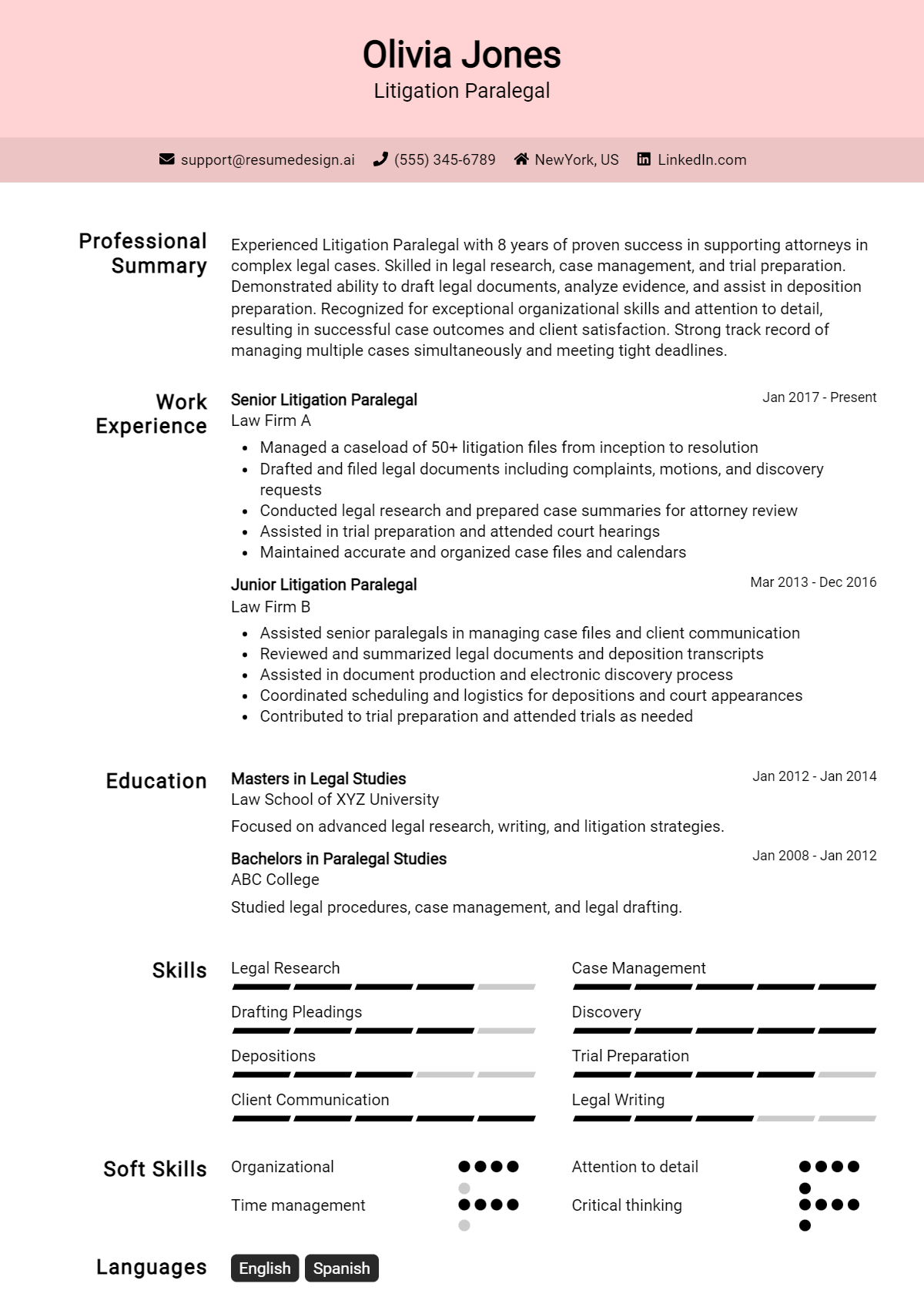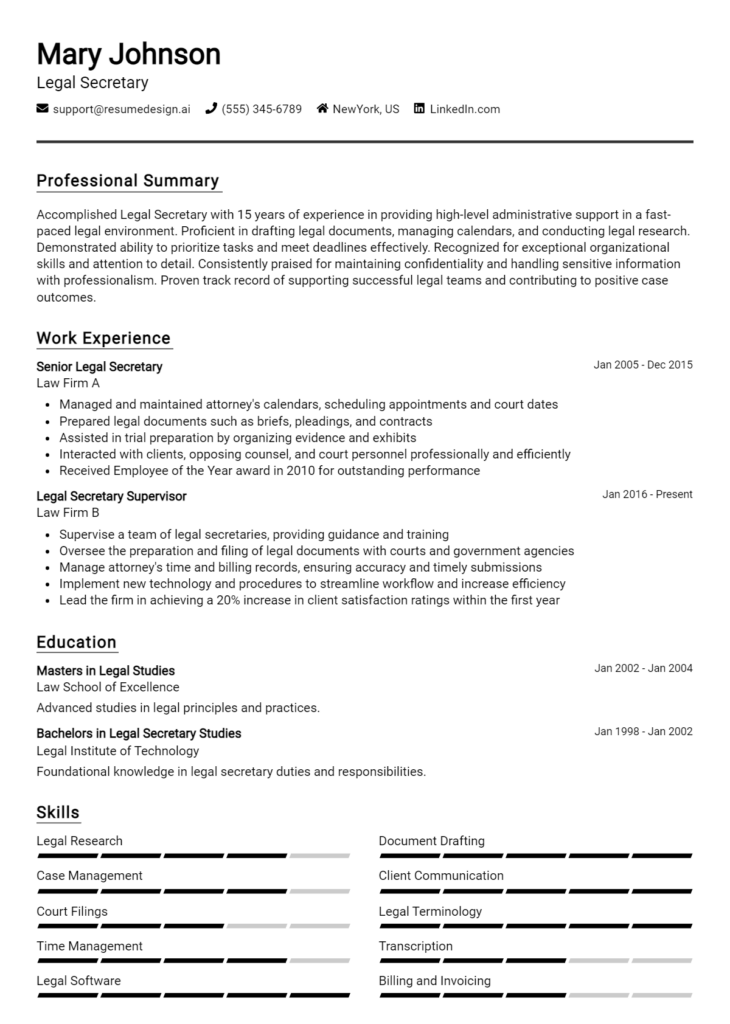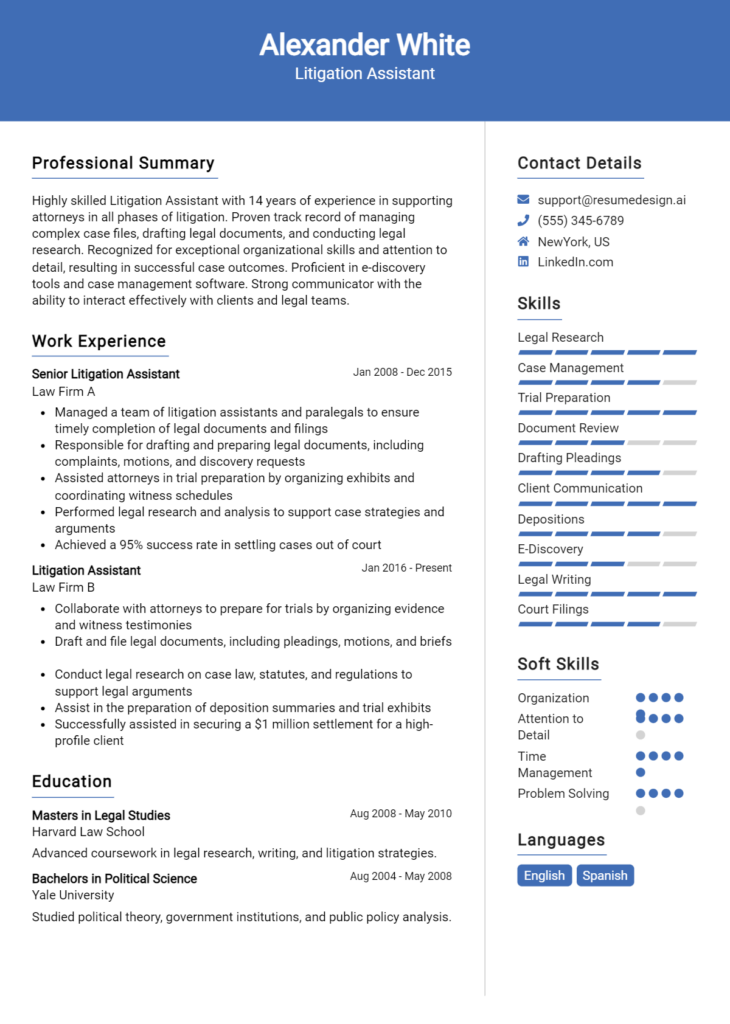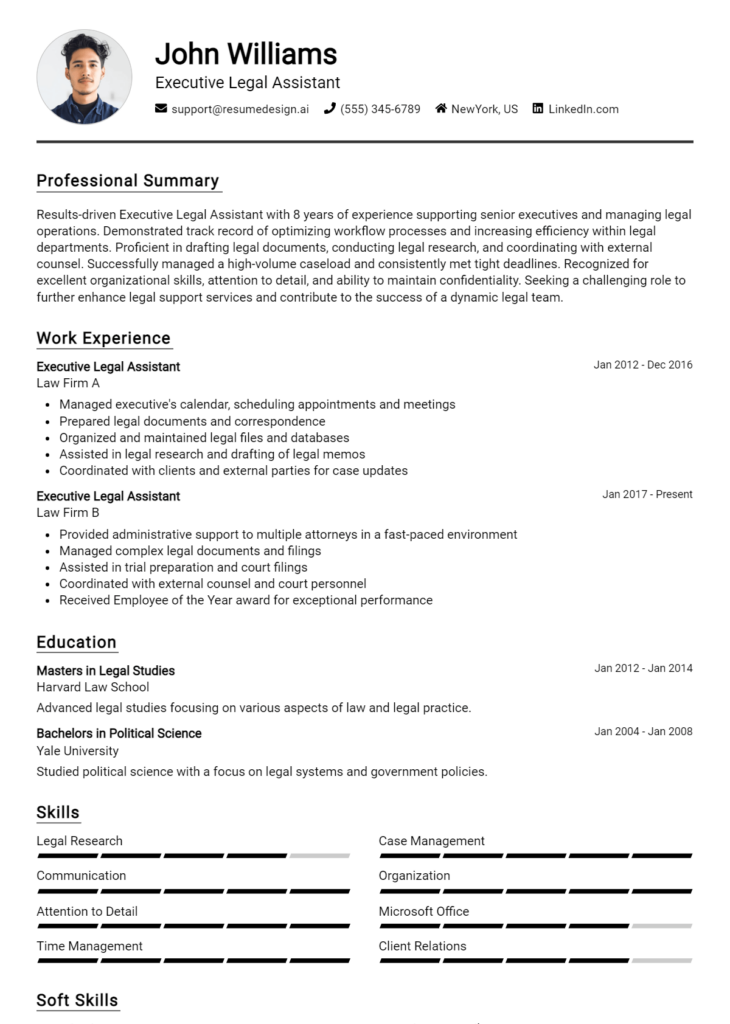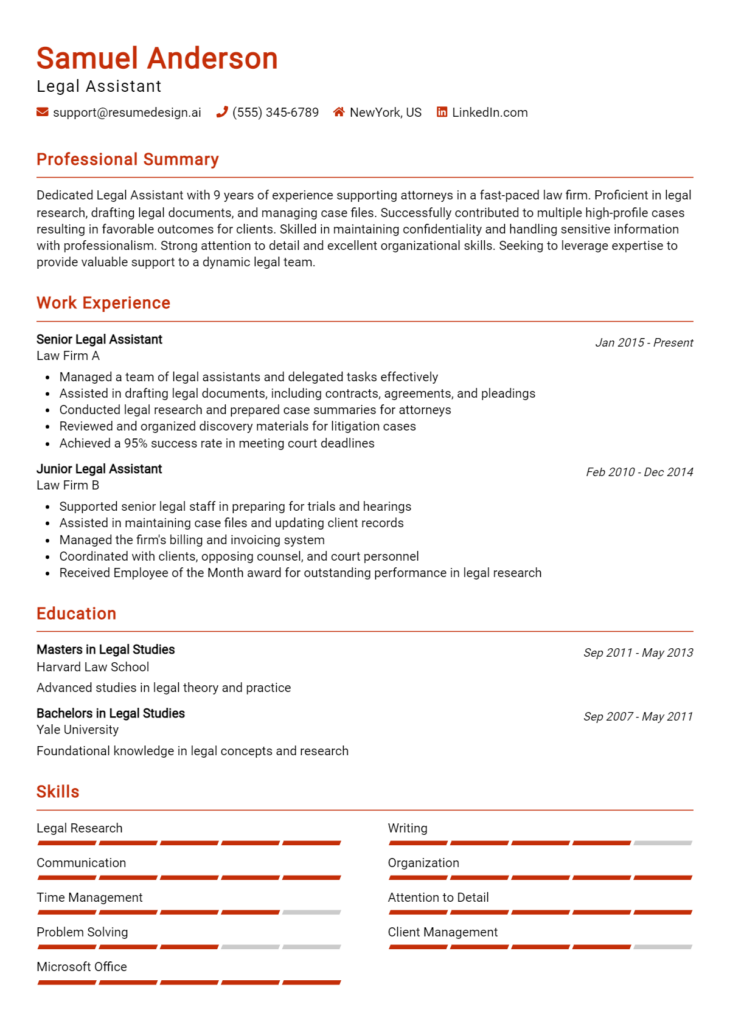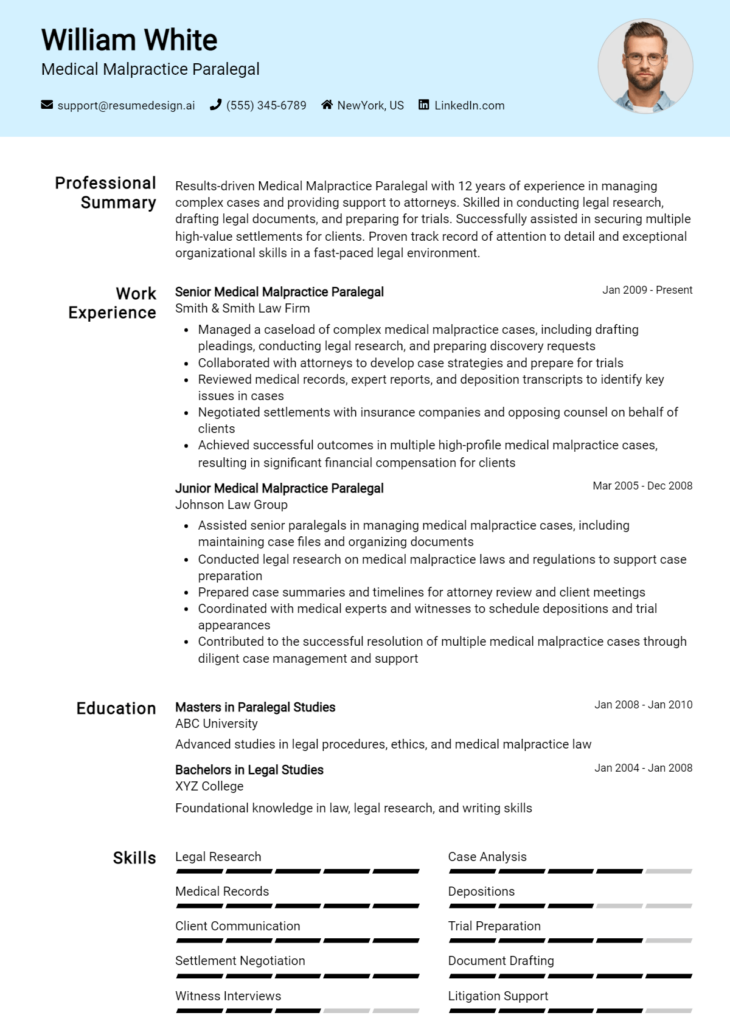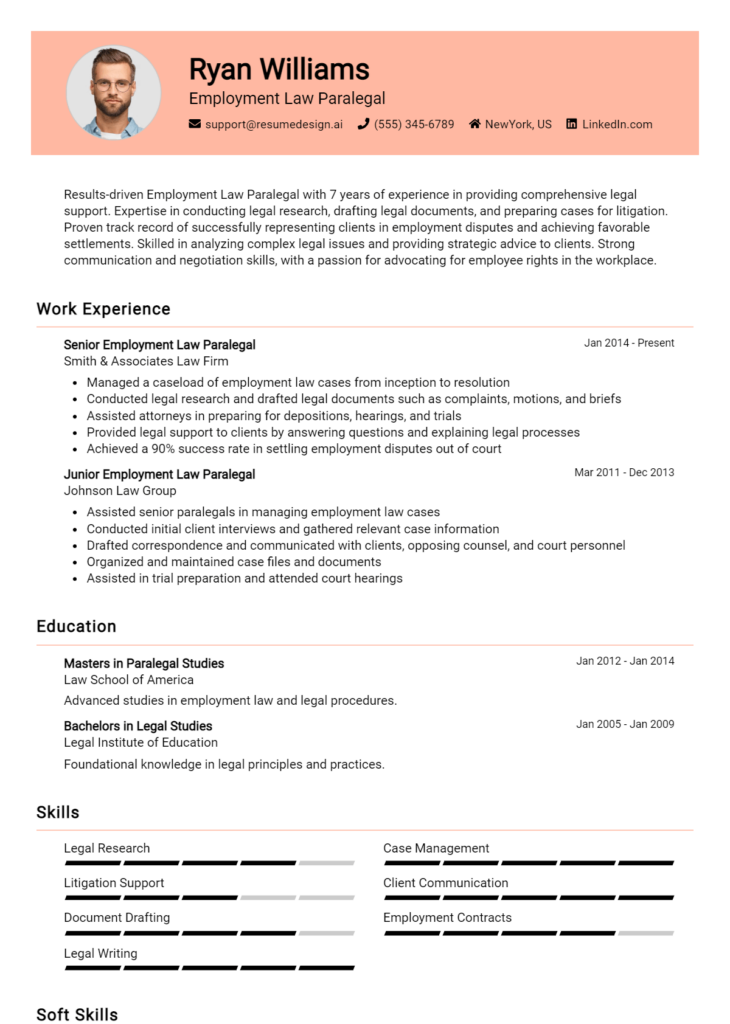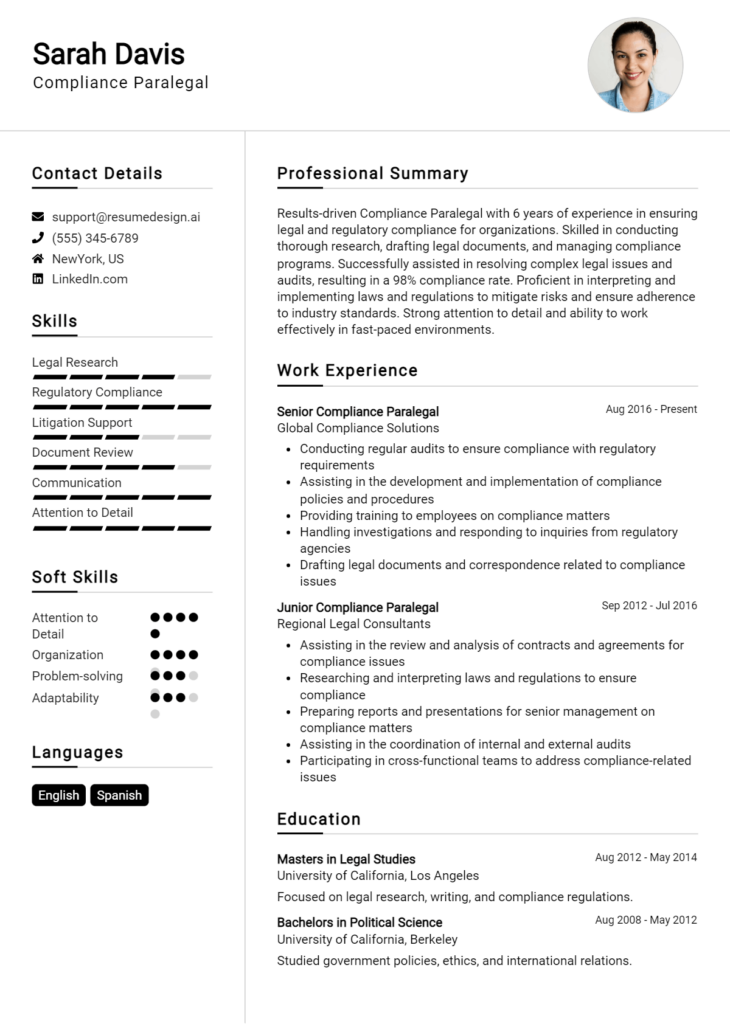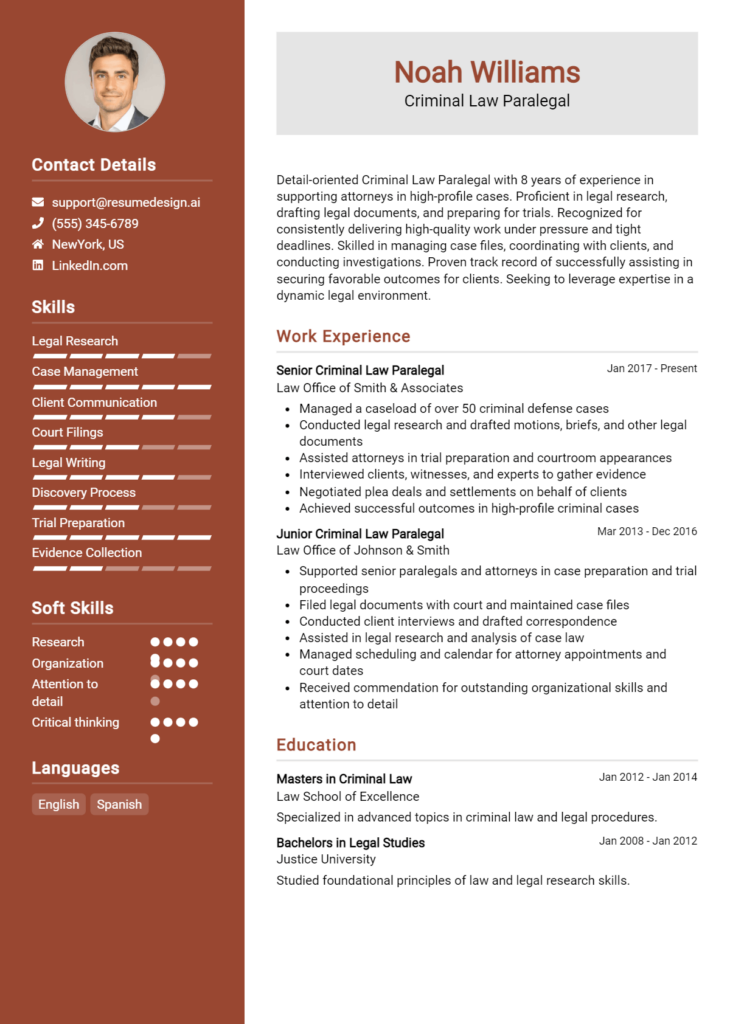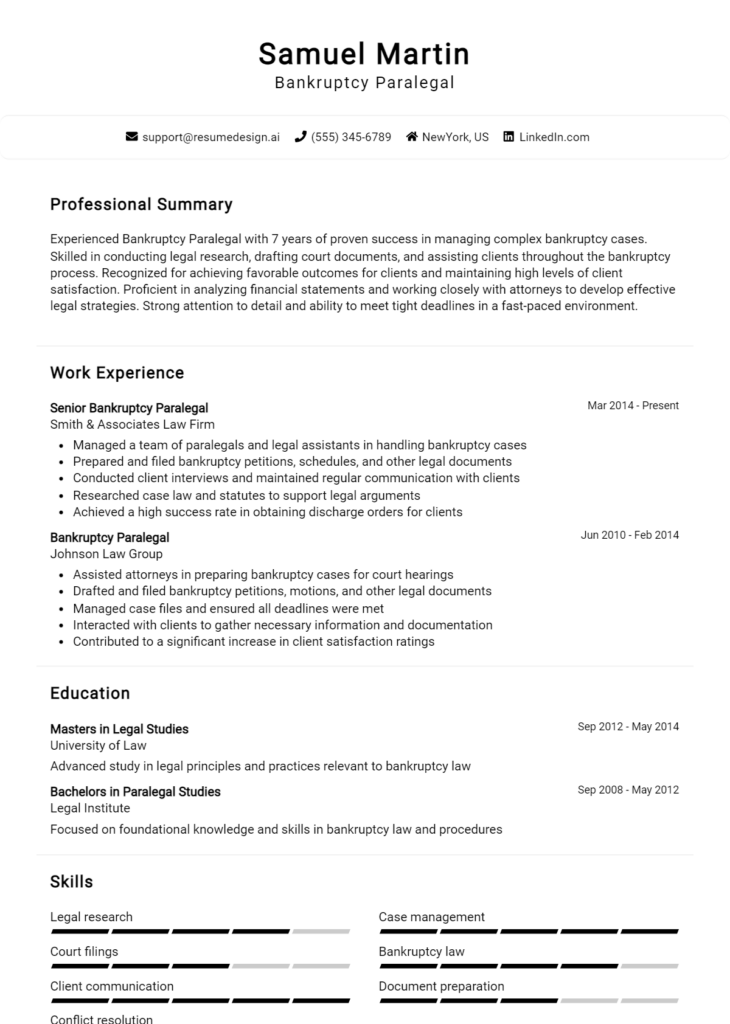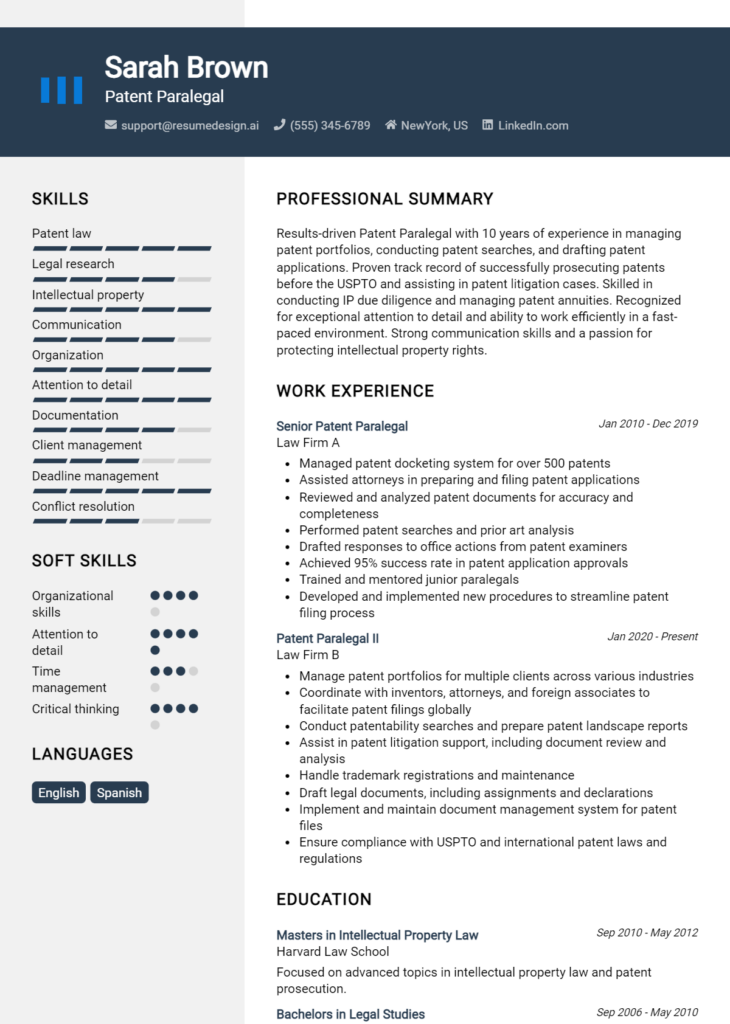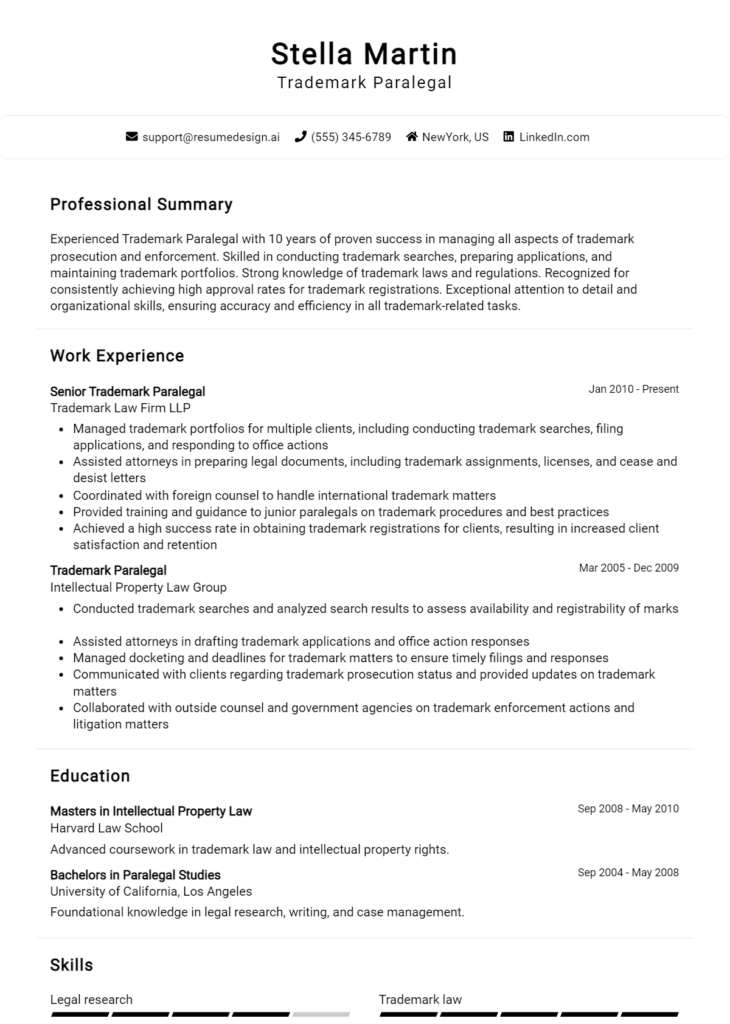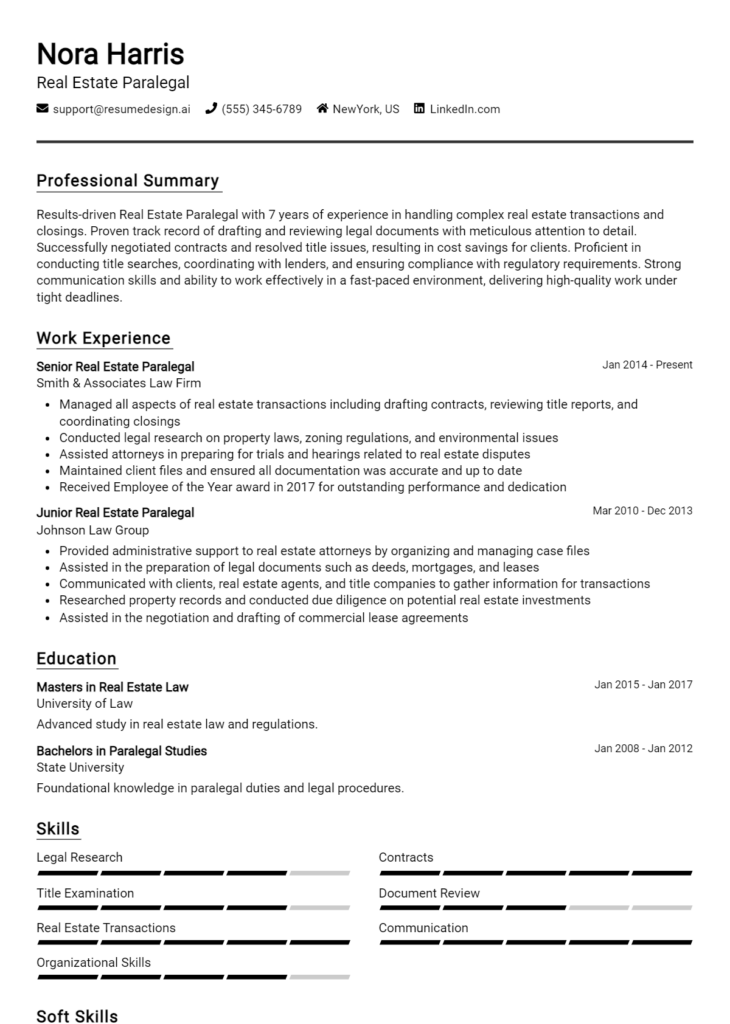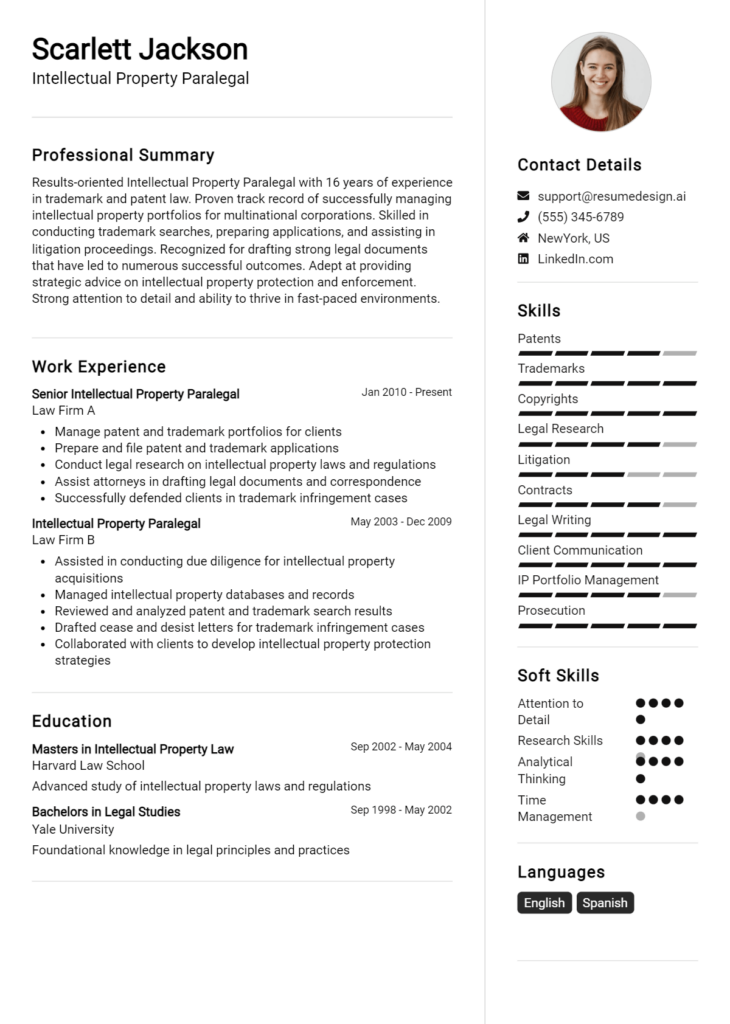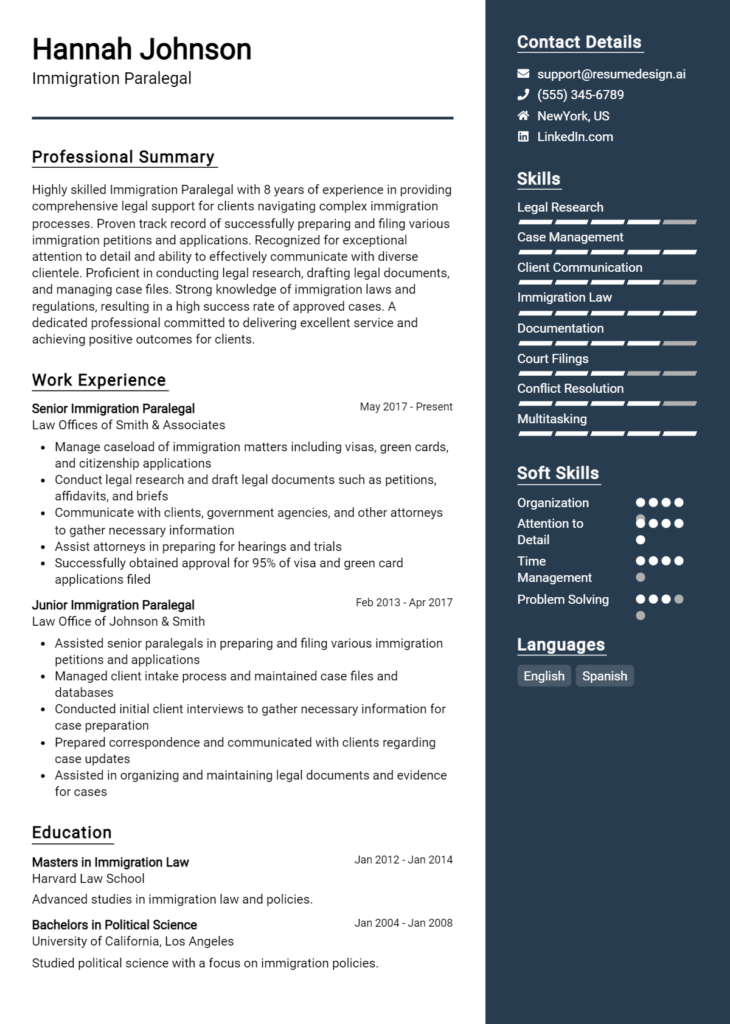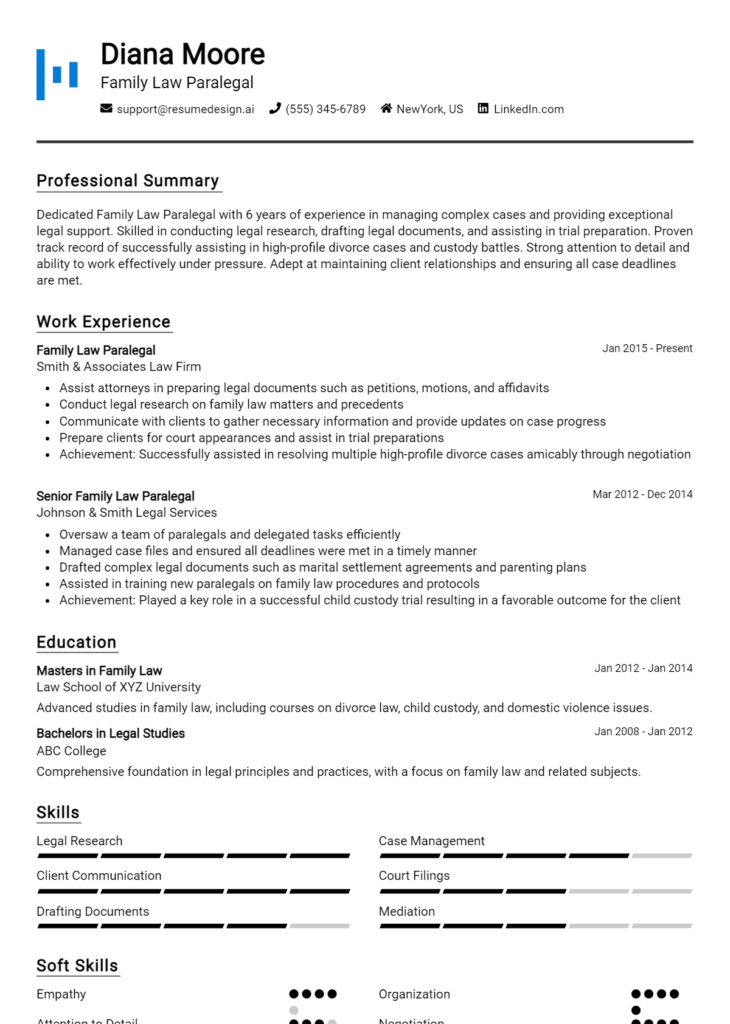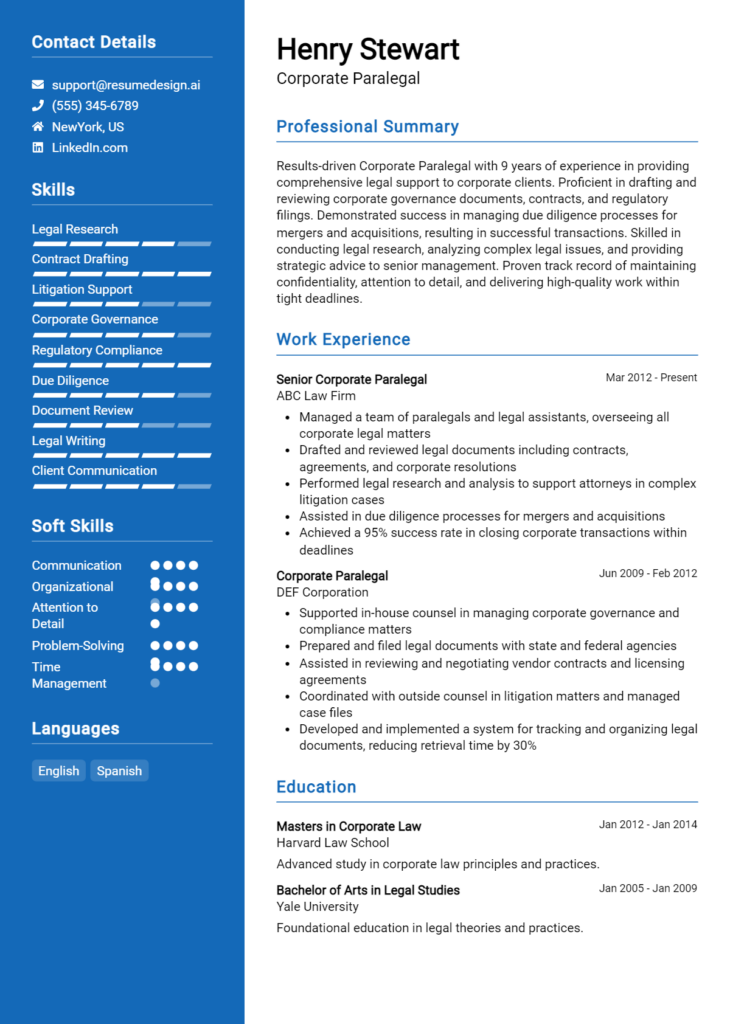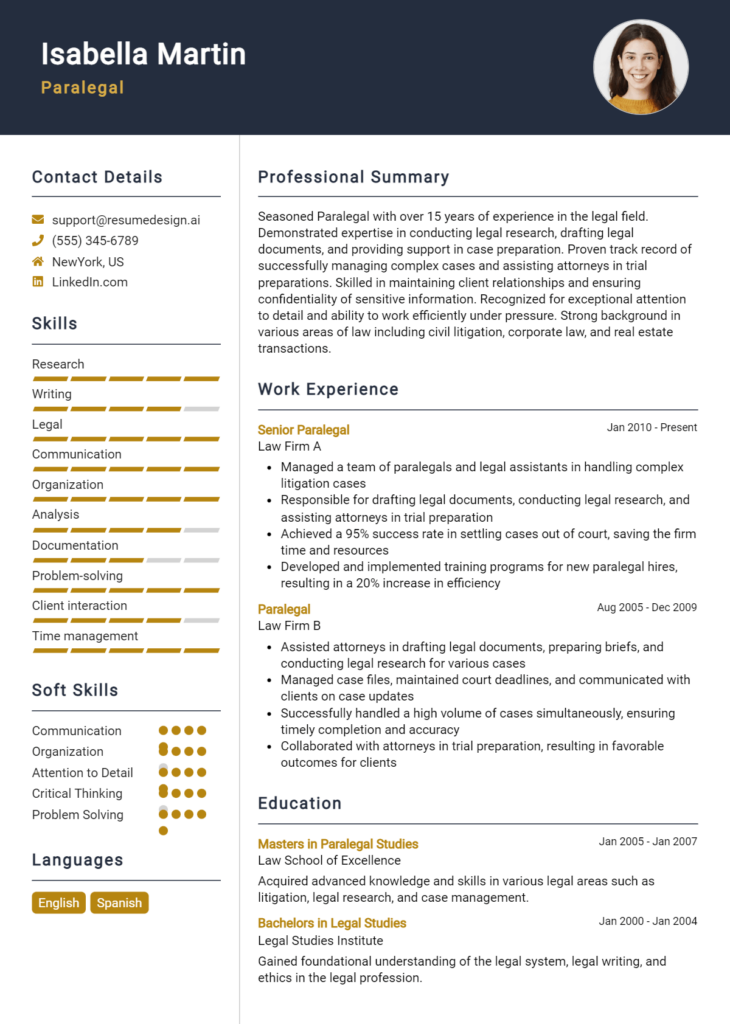Litigation Paralegal Core Responsibilities
A Litigation Paralegal plays a crucial role in the legal process by supporting attorneys in trial preparation, conducting research, and managing case files. Key responsibilities include drafting legal documents, organizing case materials, and coordinating with clients and expert witnesses. Essential skills encompass technical knowledge of legal procedures, operational efficiency, and strong problem-solving abilities, which facilitate seamless communication between departments. A well-structured resume effectively highlights these qualifications, ultimately contributing to an organization’s success in achieving favorable case outcomes.
Common Responsibilities Listed on Litigation Paralegal Resume
- Conduct legal research and gather relevant case law.
- Draft pleadings, motions, and discovery documents.
- Manage case files and maintain organized documentation.
- Assist in trial preparation, including exhibit organization.
- Coordinate communication between clients, witnesses, and attorneys.
- File documents with the court and track deadlines.
- Prepare summaries of depositions and witness statements.
- Assist in the preparation of trial binders and presentations.
- Review and analyze contracts and other legal documents.
- Conduct interviews with clients and witnesses for case insights.
- Monitor case progress and update attorneys on status.
High-Level Resume Tips for Litigation Paralegal Professionals
In the competitive field of litigation, a well-crafted resume is essential for paralegal professionals seeking to make their mark. Your resume serves as the first impression you make on potential employers, and it must effectively showcase your skills and achievements to stand out in a crowded job market. A strong resume not only highlights your qualifications but also demonstrates your understanding of the legal landscape, making it a crucial tool in your job search arsenal. This guide provides practical and actionable resume tips specifically tailored for Litigation Paralegal professionals, helping you to create a document that captures your unique strengths and experiences.
Top Resume Tips for Litigation Paralegal Professionals
- Tailor your resume to each job description by incorporating relevant keywords and phrases that align with the specific requirements of the position.
- Showcase your relevant experience prominently, highlighting your roles in litigation support, case management, and document preparation.
- Quantify your achievements by including metrics, such as the number of cases managed or the percentage of successful outcomes, to demonstrate your impact.
- Highlight industry-specific skills, including familiarity with legal research tools, knowledge of litigation procedures, and proficiency in case management software.
- Include a strong summary statement at the top of your resume that encapsulates your skills, experience, and career objectives in a few impactful sentences.
- Utilize a clean, professional format with clear headings and bullet points to enhance readability and ensure that key information stands out.
- Incorporate relevant certifications and continuing education courses to validate your expertise and commitment to professional growth.
- Focus on your soft skills, such as communication, organization, and attention to detail, which are vital for success in a litigation environment.
- Keep your resume concise, ideally one page, while ensuring that all essential information is included without sacrificing clarity.
By implementing these targeted resume tips, you can significantly enhance your chances of landing a job in the Litigation Paralegal field. A polished and tailored resume not only showcases your qualifications but also reflects your professionalism and attention to detail—qualities that are highly valued in the legal industry.
Why Resume Headlines & Titles are Important for Litigation Paralegal
In the competitive field of legal services, a Litigation Paralegal plays a crucial role in supporting attorneys through various phases of litigation. A well-crafted resume headline or title is essential as it serves as the first impression of a candidate's qualifications. A strong headline can immediately grab the attention of hiring managers, summarizing key qualifications in a single impactful phrase. It should be concise, relevant, and directly aligned with the job being applied for, effectively guiding employers to recognize the candidate's strengths and suitability for the position at a glance.
Best Practices for Crafting Resume Headlines for Litigation Paralegal
- Keep it concise and to the point, ideally under 12 words.
- Use specific language that reflects the role of a Litigation Paralegal.
- Highlight your most relevant skills and experiences.
- Incorporate keywords from the job description to align with employer expectations.
- Avoid jargon or overly complex phrases that may confuse the reader.
- Focus on achievements or unique qualifications that set you apart from other candidates.
- Tailor the headline for each application to reflect the specific job requirements.
- Make sure it captures your professional identity and career goals.
Example Resume Headlines for Litigation Paralegal
Strong Resume Headlines
Detail-Oriented Litigation Paralegal with 5 Years of Experience in Trial Preparation
Results-Driven Paralegal Skilled in Legal Research and Case Management
Dedicated Litigation Support Specialist with Expertise in Document Review and Discovery
Proven Track Record in Assisting Complex Litigation Cases with Exceptional Organizational Skills
Weak Resume Headlines
Paralegal Looking for a Job
Experienced Professional in the Legal Field
Strong headlines are effective because they are specific, highlighting relevant skills and achievements that resonate with the hiring manager's needs. They immediately communicate the candidate's strengths and create a compelling narrative that invites further exploration of their resume. Conversely, weak headlines fail to impress due to their vagueness and lack of specificity, leaving hiring managers without a clear understanding of the candidate's qualifications or what sets them apart in a crowded field. Ultimately, a strong headline serves as a powerful tool in capturing attention and setting the stage for a successful application.
Writing an Exceptional Litigation Paralegal Resume Summary
A well-crafted resume summary is crucial for a Litigation Paralegal, as it serves as the first impression a hiring manager receives about a candidate’s qualifications. In a competitive job market, a strong summary quickly captures attention by succinctly showcasing key skills, relevant experience, and notable accomplishments that align with the job requirements. It should be concise yet impactful, effectively summarizing the candidate's qualifications while being tailored to the specific position they are applying for. This strategic approach not only highlights the candidate's suitability for the role but also sets the tone for the rest of the resume.
Best Practices for Writing a Litigation Paralegal Resume Summary
- Quantify achievements: Use numbers and statistics to demonstrate the impact of your work.
- Focus on relevant skills: Highlight the skills that directly relate to the job description.
- Tailor the summary: Customize your summary for each job application to address specific requirements.
- Use strong action verbs: Begin sentences with powerful verbs that convey your contributions effectively.
- Keep it concise: Aim for 2-4 sentences that encapsulate your qualifications without overwhelming the reader.
- Include industry terminology: Use language that reflects familiarity with legal processes and litigation.
- Highlight key accomplishments: Mention specific cases or projects that showcase your expertise.
- Avoid clichés: Steer clear of overused phrases that do not add value to your summary.
Example Litigation Paralegal Resume Summaries
Strong Resume Summaries
Detail-oriented Litigation Paralegal with over 5 years of experience in managing complex civil litigation cases. Successfully organized and maintained case files for over 100 cases, resulting in a 30% reduction in preparation time. Proficient in legal research, drafting pleadings, and coordinating discovery processes.
Dedicated Litigation Paralegal with a proven track record of facilitating successful settlements in high-stakes commercial litigation. Collaborated with attorneys to prepare trial materials that contributed to a 95% win rate in litigation outcomes. Expertise in drafting motions and managing discovery documents for cases exceeding $2 million.
Results-driven Litigation Paralegal with 7 years of experience in personal injury law. Managed over 200 cases, enhancing client satisfaction ratings by 40% through effective communication and case management. Skilled in trial preparation, including the assembly of exhibits and witness preparation.
Weak Resume Summaries
I am a Litigation Paralegal with some experience and skills in the legal field. I have worked on various cases and can help with legal documents.
Litigation Paralegal with a background in different types of law. I have good organizational skills and can learn quickly. I am looking for a job where I can use my abilities.
The examples above illustrate the difference between strong and weak resume summaries. Strong summaries provide specific details about achievements, quantify results, and directly relate to the responsibilities of a Litigation Paralegal, making them compelling to hiring managers. In contrast, weak summaries lack detail, specificity, and relevance, failing to effectively communicate the candidate's qualifications or the value they can bring to the role.
Work Experience Section for Litigation Paralegal Resume
The work experience section of a Litigation Paralegal resume is crucial as it serves as a platform to demonstrate the candidate's technical skills, management capabilities, and dedication to delivering high-quality legal products. This section allows candidates to illustrate their proficiency in legal research, case management, and document preparation, while also highlighting their ability to collaborate effectively within a legal team. Quantifying achievements, such as the number of cases managed or the efficiency improvements implemented, can significantly enhance the impact of this section. Aligning work experience with industry standards ensures that potential employers can easily recognize the candidate's qualifications and suitability for the role.
Best Practices for Litigation Paralegal Work Experience
- Detail specific technical skills utilized in previous roles, such as legal research tools and case management software.
- Quantify achievements with metrics, such as the number of hours saved on case preparation or the percentage of successful case outcomes.
- Highlight leadership experiences, including managing junior paralegals or coordinating with other departments.
- Showcase collaborative projects, emphasizing teamwork and communication with attorneys, clients, and court personnel.
- Utilize action verbs to convey a proactive approach to responsibilities and achievements.
- Tailor work experience descriptions to align with job postings, using relevant keywords from the legal industry.
- Include challenges faced and how they were overcome, demonstrating problem-solving skills.
- Maintain a clear and concise format for easy readability and quick reference by hiring managers.
Example Work Experiences for Litigation Paralegal
Strong Experiences
- Managed a team of 5 paralegals to streamline case preparation processes, resulting in a 25% reduction in turnaround time for client documents.
- Conducted comprehensive legal research and drafted motions that contributed to a 90% success rate in court hearings over a two-year period.
- Developed and implemented a new case management system that improved tracking efficiency by 40%, enabling better client communication and case updates.
- Collaborated with senior attorneys on trial preparation, which resulted in a favorable outcome for 15 high-profile cases within a year.
Weak Experiences
- Assisted attorneys with various tasks as needed.
- Performed legal research and drafted documents.
- Helped with case management duties.
- Worked on multiple cases simultaneously.
The examples of work experience categorized as strong demonstrate clear, quantifiable outcomes and specific contributions that showcase the candidate's technical expertise and collaborative efforts. These experiences provide concrete evidence of skills and achievements that are easily recognizable by potential employers. In contrast, the weak experiences lack detail and context, failing to highlight specific accomplishments or the impact of the candidate's work, which diminishes their effectiveness in portraying the candidate's qualifications.
Education and Certifications Section for Litigation Paralegal Resume
The education and certifications section of a Litigation Paralegal resume is crucial in establishing the candidate's qualifications and dedication to the field. This section not only highlights the candidate's academic background but also showcases industry-relevant certifications and ongoing professional development efforts. By providing details about relevant coursework, specialized training, and recognized certifications, candidates can significantly enhance their credibility and demonstrate a strong alignment with the demands of the job role. Employers often prioritize candidates who show a commitment to continuous learning and professional excellence, making this section a key component of a successful resume.
Best Practices for Litigation Paralegal Education and Certifications
- Focus on relevant degrees, such as a Paralegal Studies degree or a Bachelor’s in Law.
- Include industry-recognized certifications, such as NALA Certified Paralegal or NFPA PACE certification.
- Detail relevant coursework that directly pertains to litigation processes, legal research, and trial preparation.
- Highlight any specialized training, such as eDiscovery or legal writing workshops.
- Ensure all entries are up-to-date and reflect current trends in the legal field.
- Use clear and concise language to describe your educational achievements and certifications.
- Consider including honors or awards received during your educational journey.
- List any continuing legal education (CLE) courses that enhance your knowledge in litigation.
Example Education and Certifications for Litigation Paralegal
Strong Examples
- Bachelor of Arts in Paralegal Studies, University of XYZ, 2022
- NALA Certified Paralegal (CP), National Association of Legal Assistants, 2023
- Advanced Civil Litigation Course, ABC Legal Institute, 2021
- Certificate in E-Discovery, DEF Training Center, 2022
Weak Examples
- Associate Degree in General Studies, Community College, 2018
- Certification in Office Administration, GHI Training Program, 2019
- High School Diploma, 2015
- Outdated Paralegal Certificate, JKL Institute, 2015
The strong examples are considered relevant because they directly align with the requirements and expectations of a Litigation Paralegal role, demonstrating the candidate's specialized knowledge and commitment to the legal field. In contrast, the weak examples are less effective as they either lack relevance to litigation or reflect outdated qualifications that do not meet current industry standards. This distinction underscores the importance of carefully selecting educational and certification credentials that enhance the candidate's profile in the competitive legal job market.
Top Skills & Keywords for Litigation Paralegal Resume
A well-crafted resume for a Litigation Paralegal is essential in showcasing the unique blend of skills needed to thrive in a fast-paced legal environment. Employers look for candidates who not only possess technical knowledge but also demonstrate strong interpersonal abilities. Highlighting the right skills can set you apart from other applicants and make a compelling case for your candidacy. A strong emphasis on both hard and soft skills will ensure your resume resonates with hiring managers and aligns with the demands of the role.
Top Hard & Soft Skills for Litigation Paralegal
Soft Skills
- Excellent communication skills
- Strong analytical thinking
- Detail-oriented mindset
- Team collaboration
- Time management proficiency
- Adaptability to changing environments
- Problem-solving ability
- Interpersonal skills
- Client relationship management
- Organizational skills
Hard Skills
- Proficient in legal research
- Document preparation and management
- Familiarity with court procedures
- Knowledge of litigation software (e.g., Clio, LexisNexis)
- Understanding of legal terminology
- Case management skills
- Evidence gathering and analysis
- Trial preparation expertise
- Proficiency in drafting legal documents
- Experience with e-discovery processes
By emphasizing these skills in your resume, you can effectively demonstrate your qualifications for the Litigation Paralegal position. Additionally, don't forget to complement your skills with relevant work experience to provide a well-rounded picture of your capabilities.
Stand Out with a Winning Litigation Paralegal Cover Letter
Dear [Hiring Manager's Name],
I am writing to express my interest in the Litigation Paralegal position at [Company Name] as advertised on [Job Board/Company Website]. With a robust background in legal support and a proven track record of assisting attorneys in complex litigation cases, I am confident in my ability to contribute effectively to your team. My experience in managing case files, conducting legal research, and preparing trial documents has equipped me with the skills necessary to excel in this role and support your firm’s commitment to delivering outstanding legal services.
In my previous role at [Previous Company Name], I successfully assisted in the preparation of numerous cases, including [specific types of cases, e.g., personal injury, commercial disputes, etc.]. I collaborated closely with attorneys to draft pleadings, motions, and discovery requests, ensuring that all documentation was meticulously organized and in compliance with court rules. My strong attention to detail and ability to manage multiple deadlines in a fast-paced environment have consistently resulted in high-quality work that meets and often exceeds expectations. Additionally, I have developed proficiency in various litigation support software and e-discovery tools, which streamlines the process and enhances overall efficiency.
I am particularly drawn to the opportunity at [Company Name] because of your firm’s dedication to [specific values or characteristics of the firm, e.g., client advocacy, innovative legal solutions, etc.]. I am eager to bring my proactive approach and strong analytical skills to your team, helping to provide exceptional support in all phases of litigation. I believe that my dedication to thoroughness and my passion for the legal field will make me a valuable asset to your firm.
Thank you for considering my application. I look forward to the opportunity to discuss how my skills and experiences align with the needs of your team. I am excited about the possibility of contributing to [Company Name] and helping to achieve successful outcomes for your clients.
Sincerely,
[Your Name]
[Your Phone Number]
[Your Email Address]
Common Mistakes to Avoid in a Litigation Paralegal Resume
When crafting a resume for a litigation paralegal position, it's crucial to present a polished and professional document that effectively highlights your skills and experiences. However, many candidates make common mistakes that can hinder their chances of landing an interview. By avoiding these pitfalls, you can ensure your resume stands out to hiring managers and accurately reflects your qualifications for the role.
Neglecting Tailoring: Failing to customize your resume for each specific job application can make it seem generic and unappealing. Tailor your skills and experiences to match the job description closely.
Excessive Length: A resume that is too long can overwhelm readers. Aim for a concise document, ideally one page, that highlights only the most relevant experiences and skills.
Poor Formatting: Using inconsistent fonts, sizes, and layout can make your resume look unprofessional. Stick to a clean, organized format that is easy to read.
Lack of Specificity: Being vague about your responsibilities and achievements can weaken your application. Use specific examples and metrics to demonstrate your contributions and successes.
Ignoring Keywords: Many employers use Applicant Tracking Systems (ATS) to filter resumes. Failing to include relevant keywords from the job posting can result in your resume not making it past the initial screening.
Overlooking Soft Skills: While technical skills are essential, neglecting to mention soft skills like communication and teamwork can be a mistake. Litigation paralegals often work closely with attorneys and clients, making these skills critical.
Inaccurate Job Titles: Listing incorrect or exaggerated job titles can lead to credibility issues. Always use the official titles from your previous positions to maintain honesty and integrity.
Skipping Proofreading: Typos and grammatical errors can create a negative impression. Always proofread your resume multiple times or ask someone else to review it before submission.
Conclusion
As we conclude our exploration of the vital role of a Litigation Paralegal, it's essential to reflect on the key responsibilities and skills that define this position. Litigation Paralegals play a crucial role in supporting attorneys through various stages of the litigation process, including conducting legal research, drafting documents, and managing case files. Attention to detail, strong organizational skills, and familiarity with legal terminology are paramount for success in this field.
With the competitive nature of the legal profession, having a well-crafted resume is essential for standing out to potential employers. It's time to take a closer look at your Litigation Paralegal resume and ensure it effectively showcases your qualifications and experiences.
To assist you in this process, we encourage you to explore a variety of resources available to enhance your job application materials. You can find resume templates to help structure your resume professionally, utilize a resume builder for a customized approach, or review resume examples that can inspire you to highlight your unique strengths. Additionally, don’t forget to check out cover letter templates to complement your resume and make a strong first impression.
Take action today and refine your resume to reflect your qualifications as a Litigation Paralegal. Your next opportunity awaits!

